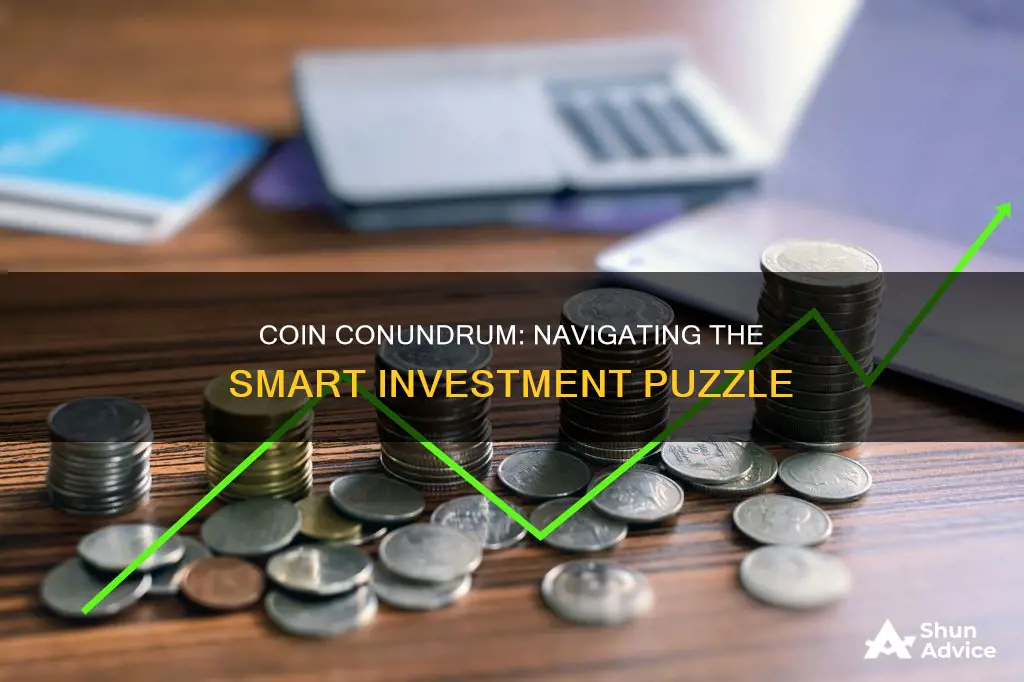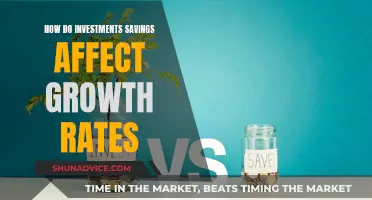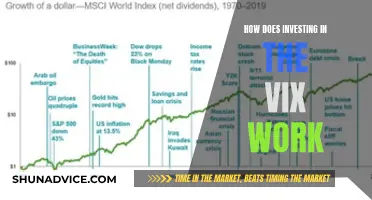
Investing in coins can be a smart move, but it depends on the type of coin and your wider financial goals. Rare coins, for example, can be a profitable long-term investment, adding diversity to a portfolio that might otherwise be focused on stocks and bonds. Silver coins, meanwhile, are an affordable way to invest in precious metals, which are often sought after in times of economic uncertainty. Silver is also a critical industrial material, which means it's likely to be in high demand in the future. However, investing in coins is not a quick way to make money, and there are downsides to consider, such as the risk of theft and the potential for high premiums.
| Characteristics | Values |
|---|---|
| Affordability | Silver is cheaper than gold, making it more accessible for investors. |
| Pricing efficiency and liquidity | Silver bars and coins closely track the prevailing spot silver price, allowing efficient entry and exit points. |
| Direct investment exposure | Physical bars and coins provide direct investment exposure without any counter-party risk. |
| Portfolio diversification | Silver has a relatively low correlation to stocks and bonds, enhancing diversification benefits. |
| Hedge against inflation | Silver can serve as a hedge against inflation, protecting the value of money. |
| Volatile price swings | Silver prices have historically exhibited higher volatility compared to gold. |
| Logistical challenges | There are logistical considerations and costs involved in safely storing and securing physical silver. |
| Speculative nature | Silver is considered more speculative than gold due to its association with industrial usage. |
What You'll Learn

Silver is a good inflation hedge
Firstly, silver is a physical commodity with intrinsic value. As a precious metal, it has a long-term use in the monetary system and is also used in industrial applications. Silver is highly conductive, making it valuable in electronics, cell phones, batteries, solar panels, and biocides. Its industrial use is only expected to grow, with the energy transition away from fossil fuels creating new sources of demand for the metal.
Secondly, silver is a good inflation hedge because it tends to increase in value when the dollar weakens. Silver also has a relatively low correlation to stocks and bonds, making it a good portfolio diversifier.
Thirdly, silver is a good store of value and can be held in physical form as bullion or coins. This makes it a safe haven against political and economic turmoil, similar to gold.
Finally, silver has a history of outperforming inflation over the long term. Since 1915, the inflation-adjusted price of silver has risen by more than 40%.
However, it is important to note that silver is a volatile asset and its price can fluctuate significantly in the short term.
TurboTax Deluxe: Seamless Investment Importing
You may want to see also

Silver is cheaper and more flexible than gold
Silver is often referred to as "poor man's gold" due to its lower price and its shared attributes with gold. As of March 2024, silver trades at about $25 per ounce, while gold trades at over $2,100 per ounce.
One of the main reasons for the difference in price between the two metals is the imbalance in supply and demand. Gold is much rarer than silver, with far less gold available in the world. The mining and extraction processes for gold are also more difficult and costly than those for silver.
Gold is also less volatile than silver. Gold serves as a store of value, meaning its value remains steady or increases over time. In contrast, silver is linked more closely to the broader market and is used more commercially, making it more susceptible to economic fluctuations.
Silver is also regarded as a hybrid precious-industrial metal due to its applications in various industries, including solar panels and electronics. This further differentiates it from gold, which is primarily seen as a monetary asset.
Despite being cheaper, silver's affordability can make it more accessible to investors. It can be a smart way to add precious metals to your portfolio, providing a hedge against inflation and enhancing diversification. However, silver prices have historically been more volatile than gold, and it is considered more speculative due to its association with industrial usage.
Insurance: A Safe Investment Bet?
You may want to see also

Silver has industrial uses
Silver has a wide range of industrial uses, which account for over half of the annual demand for the metal worldwide. Silver is used in electronics, automobiles, mirrors, and water purifiers. Its unique properties, such as its high electrical conductivity and durability, make it an essential component in many industries.
Silver is commonly used as a coating for electrical contacts, like those found in printed circuit boards, due to its high electrical conductivity and durability. Its use in electronics is expected to remain an important driver of demand. Silver is also used in the automotive industry, with every electrical action in a modern car being activated by silver-coated contacts. The amount of silver used in electric vehicles is higher than in cars with internal combustion engines. Silver is also used in brazing and soldering, which is the process of joining metal parts together to create smooth, leak-tight, and corrosion-resistant joints.
Silver's sensitivity to light has led to its use in the photovoltaic or solar energy industry. Silver is used as a conductive ink, with photovoltaic cells transforming sunlight into electricity. This is an area of expected growth in demand for silver.
Silver also has important medical applications. It has the most powerful antibacterial action with the least toxicity to animal cells of all chemical elements. Silver dressings, sutures, and bandages are used to treat wounds and ulcers, and have proven to be especially effective in healing burn victims. Silver is also used in catheters, hospital water systems, and furniture in operating theatres.
Other uses of silver include batteries, dentistry, glass coatings, LED chips, nuclear reactors, photography, RFID chips, semiconductors, touch screens, and wood preservatives.
Crypto Investments: Legal or Not?
You may want to see also

Silver is a safe-haven asset
Silver has been shown to act as a safe haven in certain periods when gold does not. Silver is also a good option for investors due to its affordability, pricing efficiency, liquidity, and direct investment exposure without counter-party risk. The tangible nature of silver holdings can also provide a sense of security for investors during times of economic uncertainty. Silver's relatively low correlation to stocks and bonds can help enhance diversification benefits.
Silver can also serve as a hedge against inflationary pressures, which could be valuable if prices remain stubbornly high. Silver's price can increase during economic growth and an increasing demand for goods that use silver. For example, the energy transition away from fossil fuels is creating an important new source of industrial demand for silver, as it is used in solar panels and electric vehicles.
However, silver prices have historically been more volatile than gold, with more frequent price swings in the short term. Silver's price can also experience larger short-term moves in both directions compared to gold's steadier characteristics. Silver is also more speculative than gold due to its association with industrial usage rather than serving primarily as a monetary metal.
Pay-for-Performance: Unraveling the Investment Advisor's Fee Structure
You may want to see also

Silver is a long-term investment
Silver has been used as legal tender for thousands of years, and its value has persisted throughout mankind's history. This lineage lends it a sense of stability. Silver is also a tangible asset with inherent and real value. It is a finite resource, and its price is less likely to completely crash compared to other financial products.
Silver is also more flexible than gold. Its lower price makes it easier for investors to sell a portion of their portfolio when needed. Silver also offers higher returns than gold. When the price of gold rises, the price of silver tends to follow, and because silver is currently worth a fraction of the price of gold, it stands to see a much bigger percentage gain if its price goes up.
Silver has industrial uses, which can cause its price to be more closely correlated with the broader economy. It is used in electronics, automobiles, mirrors, water purifiers, solar panels, and electric vehicles. This industrial demand can help silver act as an inflation hedge, as rising consumer prices often accompany economic growth and an increasing demand for goods that use silver.
However, silver's association with industrial usage also makes it more speculative than gold. Silver prices have historically been more volatile than gold, with more frequent price swings in the short term. Silver's price can experience larger short-term moves in both directions compared to gold's steadier characteristics.
Overall, silver is a long-term investment that can provide a hedge against inflation and declines in purchasing power. Its affordability, flexibility, and industrial uses make it an attractive option for investors looking to preserve their wealth and diversify their portfolios.
The Passive Investment Time Bomb: When the Bubble Bursts
You may want to see also
Frequently asked questions
It depends on the type of coins you are buying and your financial situation, goals, and risk tolerance. Coins can be a good investment if you are looking to diversify your portfolio, protect your wealth, and hedge against inflation. Rare coins, in particular, can provide significant profits over the long term, but it is important to note that earning money from investing in rare coins takes time.
Investing in coins, especially rare coins, can provide long-term gains and help diversify your portfolio. Coins are also a good investment if you are looking for a safe-haven asset to protect your wealth during economic and political turmoil. Additionally, coins made of precious metals, such as gold and silver, can act as a hedge against inflation as they have intrinsic value beyond fiat currencies and their supply is limited.
One of the main risks of investing in coins is that it may not provide short-term profits. The coin market can be volatile and fluctuate with demand. There is also a risk of theft when holding physical coins, and the lack of liquidity can make it challenging to sell coins quickly in case of an emergency.







